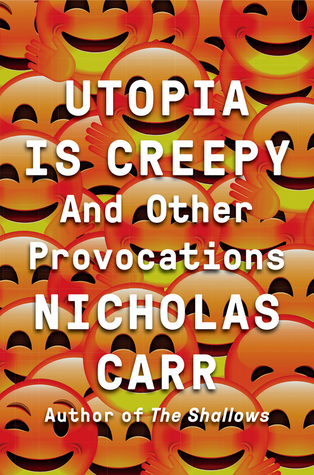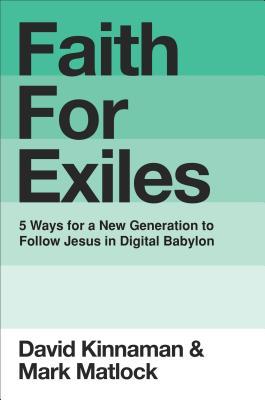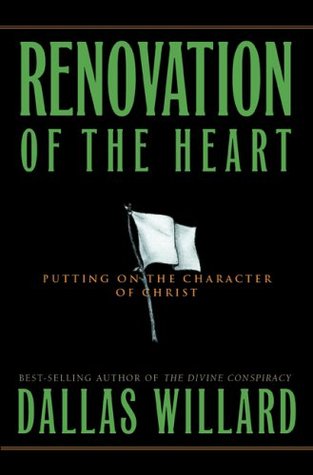
I first became aware of author Nicholas Carr a few years ago when I read his book The Shallows: What the Internet is Doing to Our Brains. That book really affected the way that I think about digital technology and social media and was one of the best books I read that year, so I was excited to also take a look at Utopia Is Creepy and Other Provocations. This book is a bit different in that, rather than being a sustained treatment of a subject, it is a collection of blog posts and essays written by Carr between 2005 and 2016. It covers a range of topics regarding technology and its continued effects on our world. Here are five ideas that stood out to me:
We work for technology
One of the draws of social media is that, in most cases, it is free to use. As a ‘consumer,’ this seems like a great deal. It’s almost as though tech companies let us use these services out of the goodness of their hearts. Carr points out, however, that it is our engagement with these services that allows them to be profitable. He writes:
The members of social networks may think they’re just ‘sharing’ their thoughts, interests, and opinions with other members, but actually they’re working for the companies that operate the networks…It’s a modern kind of sharecropping system. Like plantation owners in the American South after the Civil War, a social network gives each member a little plot of virtual land on which to cultivate an online presence, through the posting, for instance, of words and pictures, and then the social network collects the economic value of the member’s labor through advertising (or, less frequently, through subscriptions or the sale of goods). (p. 31)
For us, it’s worth remembering that using social media is a two-way street. We use the service, but the company also uses us. We need to at least recognize this fact if we are going to be wise in how we engage with social media today.
The erosion of patience
Technology is speeding up, and with it, the pace of our lives is accelerating as well. I remember when my family first got an internet-capable computer when I was a kid and we began using AOL. It took a couple minutes to log on (accompanied by that terrible crunching sound of dial-up internet). Each page would take at least a few seconds to load. But today, all of these things happen almost immediately, and I get annoyed if there is any delay. This speeding up of technology, Carr writes, is having an effect on our ability to wait for anything. He explains:
If we assume that networks will continue to get faster–a pretty safe bet–then we can also conclude that we’ll become more and more impatient, more and more intolerant of even the slightest delay between action and response, between desire and its fulfillment. As a result, we’ll be less likely to experience anything that requires waiting, that doesn’t provide instant gratification. That has cultural as well as personal consequences. The greatest of works–in art, science, politics, whatever–tend to take time and patience both to create and to appreciate. The deepest experiences can’t be measured in fractions of seconds. (p. 206)
I would add “spirituality” to Carr’s list of art, science, and politics. Patience is a fruit of the Spirit, after all (Gal. 5:22). Often, the fruits of obedience and faith take awhile to come. As technology speeds us up, is it also making it more difficult for us to practice that patience needed for a mature Christian life?
Music as activity
In one article written in 2015, Carr reflects on the Google Play Music service, which curated music playlists to go along with various activities a person may engage in. So there would be a playlist for barbecuing, one for daydreaming, one for family time, one for working out, and so on. Carr points out that this approach takes a certain slant toward music. He writes that from Google’s viewpoint, “Listening to music is not itself an ‘activity’–music isn’t an end in itself–but rather an enhancer of other activities, each of which must be clearly demarcated” (p. 208)
When I thought of my own habits, I could see what Carr is talking about. I listen to a lot of music, but often, it is simply background to whatever else I am doing. I’ll listen while I’m driving, or while I’m working in my office, or while I’m doing chores around the house. But I rarely would take time to just listen. Since reading Carr’s book, I’ve been trying to change that. Each day I’ve been listening to a complete album in my music collection–not while doing something else–but simply to listen and soak it in. And I have to say, it’s been an enjoyable part of my day!
Forfeiting privacy
There is a truth about technology that most all of us know but few of us want to admit: There is no real privacy online. Every click and keystroke is recorded somewhere. It used to be that people feared that the government (“Big Brother”) would one day seize the population’s right to privacy. Today, we gladly forfeit that privacy as we browse and post online. In an article originally written for the Wall Street Journal, Carr writes:
The greatest danger posed by the erosion of personal privacy is that it may lead us, as individuals and as a society, to devalue the concept of privacy, to see it as outdated and unimportant. We may begin to view privacy as something that gets int he way–a barrier to efficient shopping and socializing. That would be a tragedy. (p. 258)
That article was written 2010–just a few years after the introduction of the iPhone. Now, ten years later, I wonder how our value of privacy has changed even more. Is it something we care about anymore?
Politics via tweet
In an article written for Politico Magazine in 2015, Carr reflects on then-presidential candidate Donald Trump and his use of social media. It is interesting to read this article now that Trump has been in office for almost four years. I think, “Oh man…if 2015 Nicholas Carr only knew!” Carr is skeptical that a medium like Twitter can or should be a way for politicians to communicate and warns that it can reduce important discourses to trivial nonsense. He writes, “Social media favors the bitty over the meaty, the cutting over the considered. It also prizes emotionalism over reason” (p. 316). He goes on, “Political discourse rarely benefits from templates and routines. It becomes most valuable when it involves careful deliberation, an attention to detail, and subtle and open-ended critical thought–the kinds of things that social media tends to frustrate rather than promote” (p. 320).
Regardless of where you stand politically, I think Carr’s warning here is important to hear, and that it has actually played out over the last few years. Twitter is a poor place for political discourse. Nuance is lost. Careful thought isn’t rewarded; a snappy punchline is. The world today feels chaotic, and I wonder how much of that is due to the fact we have turned important discussions over to a medium never designed to carry them.
Utopia is Creepy covers a vast array of topics related to digital technology. I found some of the articles really great, and others less gripping, but that is part of the nature of a book like this. I would suggest The Shallows as a better introduction to the topic, though this collection of blog posts and essays also touches on a number of important topics that are all too easy to overlook in our technology-saturated culture today.





